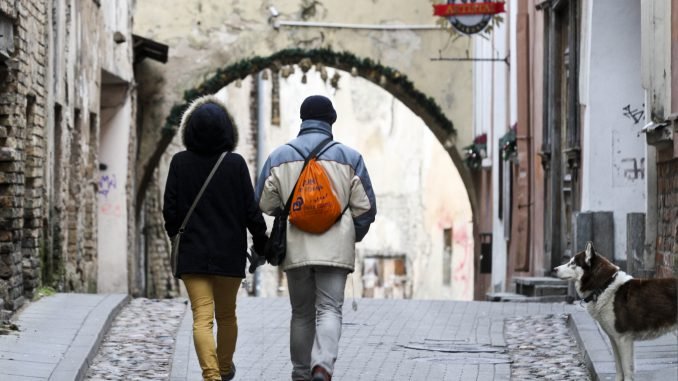
Last October, the world’s leading tourism platform Lonely Planet included Lithuania into it’s top 10 places to visit in 2015, putting it in the third spot, below only Singapore and Namibia.
According to these publications, the features that recommend Lithuania to international travellers include Lithuania’s recent accession to the eurozone, which saves much bother of exchanging currencies, one of Europe’s biggest old towns in Vilnius, a UNESCO world heritage site, as well as the Curonian Spit, a piece of untarnished nature with impressive sand dunes.
According to Geert Snaet, Belgian general manager of Holiday Inn in Lithuania and head for the Baltic region at real estate management firm Triangle, a spot in the Lonely Planet’s list might cause a chain reaction and raise Lithuania’s profile significantly.
“Lonely Planet mentioning Lithuania as one of tourist destinations is incredible,” he tells DELFI. “I spoke to my colleagues at other hotels and no one has a clue how Vilnius caught the attention of what is arguably the main international magazine, from where the message was picked up by smaller magazines. Certainly, this will have an effect on tourism. When, say, a Belgian goes to a Belgian travel agency and doesn’t know where to go, the agent tells them: go to Lithuania. And he does not risk anything, because almost every magazine is writing about Lithuania, the country is also in the eurozone.”
There’s hope, he says, that airlines will also take more interest in Lithuania as they see growing client flows going there.
“Lithuania is a country that tourists like once they come here. It shatters prejudices and leaves a very positive impression. The main factor, I think, that affects Lithuania’s popularity is that more people are coming here for international events like NATO Military Committee meeting in Vilnius, EU Council presidency events, Vilnius Capital of Culture, etc. Working visits cause a chain reaction – people get to see the country and change their preconceptions, then they come for leisure, too, with their families,” says Strategy Lab marketing consultant Audrius Savickas.
He says that professional events hosted by Lithuania are already paying dividend – the country is mentioned as a country worth visiting in foreign media increasingly often.
“I do not believe that one message in one publication could have that much of an effect. I think it is an outcome, not the reason. Also importantly, Lithuania is relatively easy to access by plane and all price tags are now in euros. Moreover, Lithuania is often thought of as a relatively safe country, free of, for example, divisive religious conflicts,” Savickas says.
He has heard many of his business clients complimenting Lithuania’s service sector – foreigners are happy with the service culture and quality.
“Many people in Lithuania speak several foreign languages, which is not taken for granted in some countries. So there is a whole bunch of reasons to see Lithuania, media spot them and there starts the snowball effect reinforcing the message and expanding its reach,” Savickas thinks.
Growing popularity
The State Tourism Department says that Lithuania’s moment of fame began several years ago.
“Over the last several years, Lithuania has been among leading European countries in terms of growing tourist flows,” says the department’s spokeswoman Edita Gaigalienė. “This draws media’s attention and make them look into Lithuania, its tourism potential, culture, sites, people.”
She says that media tours have contributed to Lithuania making into Lonely Planet’s list.
“After this recognition – a veritable tourism Oscar award – there was a chain reaction: Lithuania as a must-see place was reported by Forbes, Business Insider, CNN and other reputable outlets,” Gaigalienė says.
According to the State Tourism Department, Lithuania has been in Ethical Travel’s list of top ten ethical destinations since 2013. The criteria used by the American organization include environmental protection and authentic cultural experience.
“All these factors are good for tourism growth. We have noticed growing interest in Lithuania in international tourism fairs, there have been more enquiries from foreign media, people want to come and take part in the State Tourism Department’s tours,” Gaigalienė says.
Image still requires work
Despite growing interest in Lithuania, the country still feels it has image issues. A blow that many Lithuanians still cannot forget was when Hollywood actor Mel Gibson called them “sharp-toothed” and “armed with baseball bats”.
“No one associates Lithuanians with that image any more, but we still do not work on our image enough, one still wonders why there are such preconceptions about Lithuania in the first place,” Savickas says. “It might have to do with historical facts and ideas about Eastern Europe. We have yet to define for ourselves what Lithuania’s image should be.”
According to experts, each mentioning in international press brings benefit to the country, although it is hard to estimate how much exactly, in terms of tourist numbers.
“When a person hears about Lithuania once, twice, three times, after some time they feel the urge to check flights. In marketing, we talk of a factor like the number of tries – therefore when introducing a new product, it is important to have people try it, for example, taste a food product. The same applies to tourism – if there is a business trip and a person must come for a conference, they get to see the country and get a good impression. This means that preconceptions are much worse than reality,” Savickas notes.
He adds that there is a link between venues chosen for business meetings and destinations later chosen for leisure trips. Therefore choosing a right places to host an international conference is an effective way to encourage tourism.

Be the first to comment